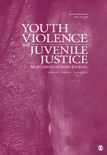
Youth Violence and Juvenile Justice
Scope & Guideline
Transforming Understanding of Youth Violence
Introduction
Aims and Scopes
- Youth Violence Prevention:
Focuses on research related to understanding the causes, consequences, and prevention strategies for youth violence, including interventions and community programs. - Juvenile Justice System Dynamics:
Explores the functioning of the juvenile justice system, including legal processes, decision-making, and the impact of policies on youth outcomes. - Adverse Childhood Experiences (ACEs):
Investigates the correlation between ACEs and juvenile delinquency, emphasizing the psychological and social impacts of childhood trauma on youth behavior. - Recidivism and Risk Assessment:
Analyzes factors contributing to recidivism among justice-involved youth, including the effectiveness of risk assessment tools and intervention strategies. - Family and Community Influences:
Examines the roles of family dynamics, peer relationships, and community contexts in shaping youth behavior and involvement in the justice system.
Trending and Emerging
- Trauma-Informed Approaches:
There is a growing emphasis on trauma-informed care and interventions that address the psychological impacts of trauma on youth, reflecting an understanding of its role in delinquency. - Intersectionality in Youth Offending:
Research increasingly explores the intersection of race, ethnicity, gender, and socioeconomic status in understanding youth violence and justice system outcomes. - Positive Youth Development:
Emerging studies focus on resilience and positive childhood experiences (PCE), examining how these factors can mitigate the effects of adversity and reduce recidivism. - Community-Based Interventions:
There is a trend towards investigating the effectiveness of community-based programs and restorative justice practices that engage youth in constructive ways, rather than punitive measures. - Mental Health and Youth Violence:
An increasing number of papers are addressing the mental health needs of justice-involved youth, exploring how mental health interventions can influence outcomes in the juvenile justice context.
Declining or Waning
- Traditional Punitive Approaches:
Research focusing on punitive measures within the juvenile justice system is becoming less prevalent as the field increasingly advocates for rehabilitative and restorative approaches. - Solely Biological Determinism:
Studies that attribute youth violence and delinquency solely to biological factors are waning, giving way to a more nuanced understanding that incorporates social and environmental influences. - Static Risk Factors:
There is a noticeable decrease in studies that rely on static risk factors for predicting delinquency, with more emphasis now on dynamic and contextual factors that can change over time.
Similar Journals
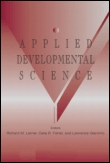
Applied Developmental Science
Connecting theory and practice in the realm of developmental science.Applied Developmental Science is a leading academic journal dedicated to enhancing the understanding of human development across the lifespan. Published by Routledge Journals, Taylor & Francis Ltd, this esteemed journal stands out in its field with a remarkable impact factor and prestigious Q1 classification in Applied Psychology, Developmental and Educational Psychology, and Life-span and Life-course Studies, as of 2023. By focusing on empirical research and innovative theoretical perspectives, Applied Developmental Science serves as a vital resource for researchers, professionals, and students alike, fostering a deep understanding of developmental processes. The journal’s high rankings highlight its influence and commitment to advancing knowledge in developmental psychology. Although not an open-access publication, it provides invaluable insights for those engaged in developmental science, making it a cornerstone for academic inquiry and professional practice within the discipline.
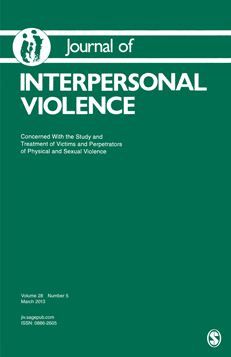
JOURNAL OF INTERPERSONAL VIOLENCE
Fostering Change Through Empirical ResearchJournal of Interpersonal Violence, published by SAGE Publications Inc, stands as a leading scholarly outlet in the fields of Applied Psychology and Clinical Psychology, as evidenced by its prestigious Q1 rankings in both categories for 2023. With a history dating back to 1986 and an anticipated scope extending to 2024, this journal provides a vital platform for the dissemination of research focused on the multifaceted aspects of interpersonal violence, including its causes, consequences, and prevention strategies. The journal's emphasis on empirical studies and theoretical advancements aims to bridge the gap between research and practical application, making it an essential resource for researchers, professionals, and students dedicated to understanding and addressing the challenges of interpersonal violence. While it is not an open-access journal, its impactful contributions are reflected in a competitive Scopus ranking, placing it within the top percentiles of its categories, ensuring that published research reaches a wide audience committed to making a difference in this critical field.

Journal of Family Trauma Child Custody & Child Development
Navigating Complexities of Child Custody and DevelopmentWelcome to the Journal of Family Trauma Child Custody & Child Development, a leading academic platform dedicated to advancing research and knowledge in the crucial intersections of family dynamics, child custody, and developmental psychology. Published by Routledge Journals, Taylor & Francis Ltd, this esteemed journal seeks to address the pressing issues surrounding family trauma and child development from both a psychological and legal perspective. With its ISSN 2690-4586 and E-ISSN 2690-4594, this peer-reviewed journal has shown significant growth since its inception in 2020, achieving impressive rankings within its categories: Q2 in Law, demonstrating a robust foundation in legal perspectives affecting child custody, as well as Q3 in Health (Social Science) and Q4 in Developmental and Educational Psychology, underscoring its diverse impact. As researchers, professionals, and students explore the complex relationships between family structure, trauma, and child welfare, this journal remains a vital resource for insightful analysis and practical applications, contributing significantly to the evolving conversation in these critical fields. Note that while it provides traditional access options, the journal also encourages a broader outreach to diverse stakeholders interested in enhancing child development and family law practices.

Journal of Criminal Psychology
Shaping the future of law enforcement with evidence-based research.Journal of Criminal Psychology, an esteemed publication by EMERALD GROUP PUBLISHING LTD, serves as a pivotal resource in the interdisciplinary study of criminal behavior through the lenses of psychology and law. Since its inception in 2011, this journal has significantly contributed to the understanding of psychological principles as they apply to crime, law enforcement, and social justice, making it a vital source for both researchers and practitioners. With a commendable ranking of Q1 in Law and Q3 in Applied and Social Psychology for 2023, the journal guarantees high-quality research findings that can influence policy and practice across these domains. Although it does not offer open access, its rigorous peer-review process ensures that every published article adheres to the highest academic standards. The Journal of Criminal Psychology not only fosters academic discourse but also drives innovation in criminal justice practices, making it essential reading for anyone dedicated to the enhancement of ethical standards in legislation and law enforcement.

Residential Treatment for Children & Youth
Bridging research and practice for better outcomes.Residential Treatment for Children & Youth is a leading journal published by Routledge Journals, Taylor & Francis Ltd, specializing in the fields of social sciences, law, and child health. Established in 1986, this peer-reviewed journal offers a vital platform for the dissemination of research focused on the behavioral and psychological treatment of children and adolescents within residential settings. With a Scopus ranking of #246 in Social Sciences (Law) and #180 in Pediatrics, this journal maintains a high impact factor and primarily caters to academics, practitioners, and policymakers interested in the evolving challenges and best practices in residential treatment. Although it does not provide Open Access options, it remains a key resource for those seeking rigorous and insightful studies in child welfare and mental health. By bridging research and practice, Residential Treatment for Children & Youth aims to improve outcomes for vulnerable youth and exemplifies a commitment to advancing knowledge in this critical area.

JOURNAL OF CRIMINAL JUSTICE
Uncovering critical issues in law and behavior.The JOURNAL OF CRIMINAL JUSTICE, published by Elsevier, stands at the forefront of interdisciplinary research at the nexus of law, psychology, and sociology. With an impressive impact factor and consistently ranking in the Q1 category across multiple disciplines, including Applied Psychology and Law, this journal serves as a vital platform for exploring critical issues in criminal justice policy, behavior, and system effectiveness. Since its inception in 1973, the journal has evolved its scope to encompass contemporary challenges and innovative responses within the field. Researchers, professionals, and students can benefit from access to high-quality, peer-reviewed articles that not only reflect current trends but also drive future discourse. Though currently not open access, the journal's rigorous standards ensure that all published works contribute significantly to advancing knowledge and practice in criminal justice and related areas.

YOUTH & SOCIETY
Empowering Research on Youth Identity and PolicyYOUTH & SOCIETY is a premier academic journal published by SAGE Publications Inc, dedicated to advancing the understanding of the complex dynamics that shape the lives of young people within societal contexts. Established in 1969, this journal has become a vital resource in the fields of sociology and political science, consistently ranked in the Q1 category across various social science classifications, including a remarkable 51 out of 604 in general social sciences as of 2023. With its rigorous peer-reviewed articles, YOUTH & SOCIETY encompasses a diverse range of research topics, from youth culture and identity to education and social policy, making it an indispensable tool for researchers, professionals, and students alike. Although it does not currently offer Open Access, the journal's commitment to academic excellence is evident through its impressive Scopus rankings in sociology and broader social sciences. With each issue, YOUTH & SOCIETY continues to contribute significantly to the discourse surrounding youth and social transformation, enriching our understanding of the roles and experiences of young individuals in today’s complex social landscape.

Child & Youth Services
Empowering Futures: Transforming Child and Youth WelfareChild & Youth Services is an esteemed academic journal published by Routledge Journals, Taylor & Francis Ltd, focusing on the multidimensional aspects of child and youth welfare, development, and services. With an ISSN of 0145-935X and an E-ISSN of 1545-2298, this journal has been a vital platform for research disseminating innovative strategies and practices for improving the quality of life for children and adolescents globally. Its editorial board comprises experts in the field, ensuring rigorous peer review and high scholarly standards. The journal currently holds a Q3 rank in Health (Social Science) and a Q2 rank in Social Sciences (Miscellaneous) indicating its growing influence and relevance. Researchers and practitioners can greatly benefit from its comprehensive discourse, which spans multiple years of converged research from 1977 to 2024. Although not open access, the journal provides vital insights into contemporary issues, making it essential reading for those engaged in child and youth services, policy-making, and academic study.
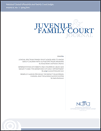
JUVENILE AND FAMILY COURT JOURNAL
Navigating Challenges in Family and Juvenile CourtsThe JUVENILE AND FAMILY COURT JOURNAL, published by Wiley, is an esteemed platform dedicated to the intersection of law, juvenile justice, and family dynamics. With an ISSN of 0161-7109 and an E-ISSN of 1755-6988, this scholarly journal serves as a vital resource for researchers and practitioners focused on the evolving challenges within family law and juvenile courts. Since its inception in 1953, the journal has provided a critical forum for peer-reviewed articles that highlight best practices, theoretical frameworks, and contemporary issues affecting families and minors. Holding a prestigious Q2 ranking in Law and Q3 in Social Sciences (miscellaneous) in 2023, it continues to drive impactful discourse within the legal community. Although it is not an open-access journal, the insights and findings presented are indispensable for those committed to advancing knowledge and policy in juvenile and family law. By fostering interdisciplinary collaboration, the JUVENILE AND FAMILY COURT JOURNAL plays a crucial role in shaping the future of justice for children and families across the United States.
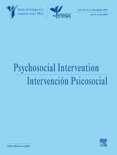
Psychosocial Intervention
Advancing psychosocial knowledge for a brighter tomorrow.Psychosocial Intervention is an esteemed academic journal devoted to the field of psychology, published by the COLEGIO OFICIAL PSICOLOGOS MADRID. With a strong commitment to advancing knowledge since its inception in 1992, this Open Access journal provides a platform for researchers and practitioners to disseminate their findings and insights. Recognized for its rigorous standards, Psychosocial Intervention has achieved impressive rankings in 2023, being placed in the Q1 Quartile for Applied Psychology, Developmental and Educational Psychology, and Social Psychology, reflecting its leading status in the field. Furthermore, the journal holds commendable rankings in Scopus: Rank #31 in Developmental and Educational Psychology and Social Psychology, and Rank #40 in Applied Psychology, showcasing its contribution to impactful research. This journal not only serves as a vital resource for the academic community in Spain but also positions itself prominently on the international stage, encouraging collaboration and dialogue among scholars seeking to enhance psychosocial practices and interventions.